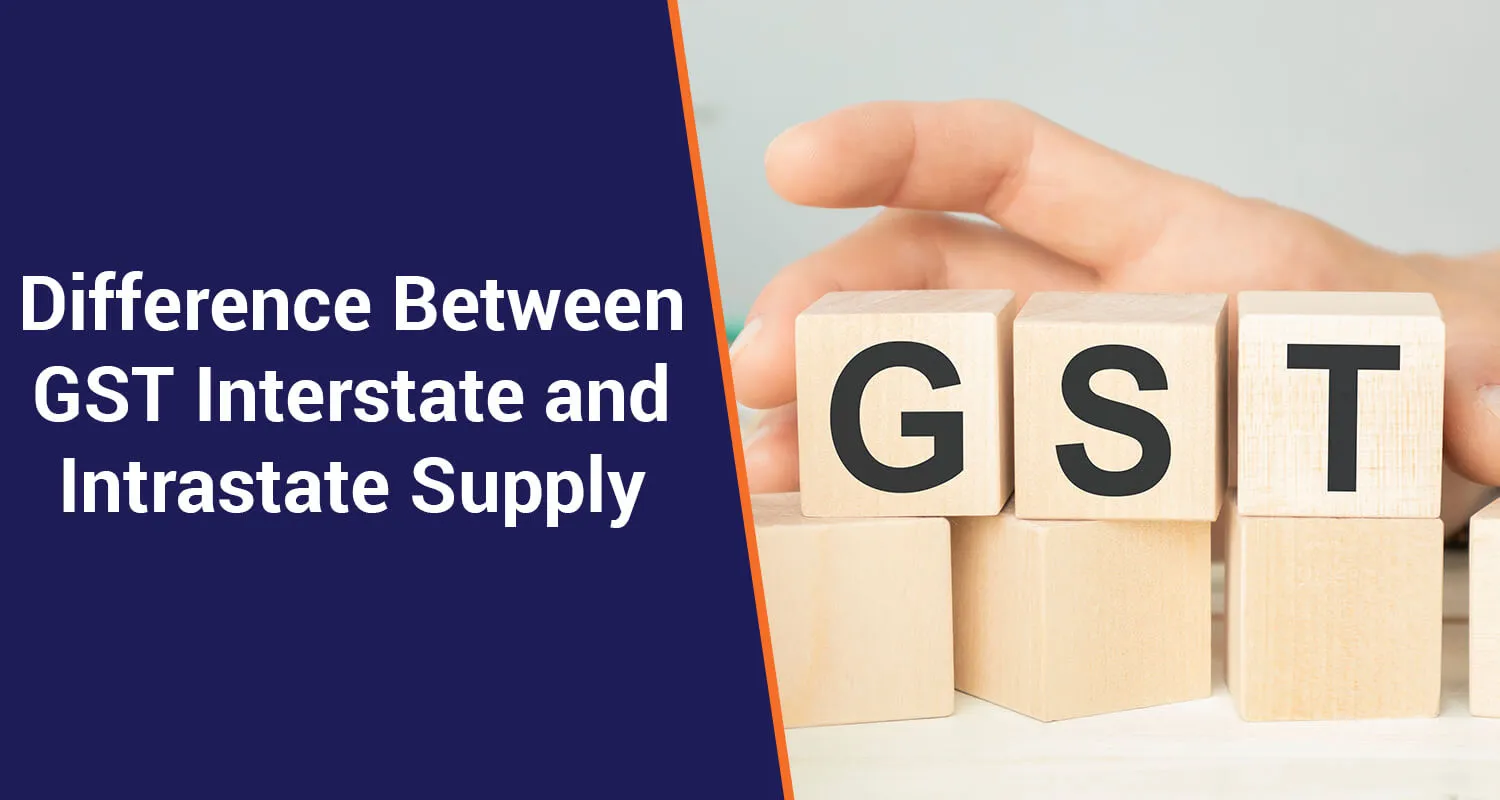Know the Key Difference Between Interstate and Intrastate Supply GST?
Table of Contents
GST, introduced in India in 2017, has revolutionized the taxation system. One crucial aspect of GST is differentiating between interstate and intrastate supplies, determining the applicable taxes. Let's understand interstate and intrastate meaning. For this let’s delve into the disparities between these two types of supplies under GST.
What is the GST Interstate?
Interstate meaning in GST: GST Interstate refers to the movement of goods or services between different states or Union Territories (UTs) within India. In the Goods and Services Tax (GST) regime, interstate transactions are subject to specific tax regulations distinct from intrastate supplies.
Interstate transactions are significant because they involve the movement of goods/services across state borders, leading to complexities in tax compliance and revenue distribution between the central and state governments.
Example:
Interstate meaning in GST: Suppose a clothing manufacturer based in Karnataka sells garments to a retailer in Tamil Nadu. This transaction qualifies as a GST Interstate supply since it involves the movement of goods from one state (Karnataka) to another (Tamil Nadu). The applicable tax, Integrated GST (IGST), is levied by the central government and then distributed between the two states.
Difference between GST: Interstate Vs Intrastate
(Difference between Sample 1 & Sample 2: Intrastate vs Interstate)
|
Parameters |
GST Interstate |
GST Intrastate |
|
Tax Applicability |
Applies to transactions between different states or UTs |
Pertains to transactions within the same state or UT |
|
Tax Levied By |
Central Government |
Central and State/UT Governments |
|
Tax Rate |
IGST (Integrated Goods and Services Tax) |
CGST (Central Goods and Services Tax) and SGST (State Goods and Services Tax) |
|
Destination State |
Receives a share of the IGST collected |
Receives the entire amount of SGST collected |
|
Place of Supply |
Different state/UT from the supplier's location |
Same state/UT as the supplier's location |
|
Input Tax Credit |
IGST credit offsets IGST, CGST, or SGST liabilities |
CGST and SGST credits can offset respective liabilities |
Sapna aapka. Business Loan Humara.
Apply NowWhich is Better: Interstate or Intrastate GST?
Determining whether interstate or intrastate GST is better depends on various factors, including the nature of the business, the volume of transactions, and compliance requirements. Here's a comparison to help you understand which option might be more suitable:
1. Scope and Reach:
- Interstate GST: Suitable for businesses operating across multiple states or supplying goods/services to customers in different states.
- Intrastate GST: Ideal for businesses that primarily operate within a single state or Union Territory and have minimal interstate transactions.
2. Tax Rates and Compliance:
- Interstate GST: Involves the application of Integrated Goods and Services Tax (IGST) at a unified rate, simplifying tax calculation and compliance.
- Intrastate GST: Requires the administration of Central Goods and Services Tax (CGST) and State/UT Goods and Services Tax (SGST/UTGST), adding complexity to compliance and accounting processes.
3. Revenue Sharing:
- Interstate GST: Revenue collected as IGST is shared between the central and state governments based on predetermined formulas, ensuring equitable distribution.
- Intrastate GST: Entire tax revenue remains within the jurisdiction of the state or Union Territory where the transaction occurs, providing direct benefits for local development and infrastructure.
4. Logistics and Supply Chain Management:
- Interstate GST: Relevant for businesses with complex supply chains involving the movement of goods across state borders, requiring efficient logistics management. Learn about the place of supply in gst.
- Intrastate GST: Simplifies logistics as transactions occur within a single geographical area, reducing transportation costs and logistical challenges.
In conclusion, the suitability of interstate or intrastate GST depends on each business's specific requirements and operational scope. While interstate GST offers uniformity and simplicity for businesses with interstate operations, intrastate GST directly benefits businesses focused on local markets and operations within a single state or Union Territory.
Conclusion
In essence, the disparities between interstate and intrastate supplies lie in tax applicability, levying authority, and the destination of tax revenue. Understanding the differences is pivotal for businesses to comply with GST regulations effectively.
FAQs
Q1. What determines whether a supply is interstate or intrastate under GST?
Ans. The location of the supplier and the place of supply determines whether a supply is interstate or intrastate under GST.
Q2. Can an intrastate supply be made to a Special Economic Zone (SEZ)?
Ans. No, supplies made to or from SEZs within the same state are considered interstate supplies under GST.
Q3. How are taxes distributed in interstate supplies?
Ans. In interstate supplies, IGST is levied by the Central Government, and the revenue collected is shared between the central and destination states.
Q4. Can input tax credit from IGST be used for CGST and SGST liabilities?
Ans. Yes, input tax credit from IGST can be used to offset IGST, CGST, or SGST liabilities, following a predefined order.
Q5. What are the GST rates applicable to interstate and intrastate supplies?
Ans. The GST rates depend on the type of goods or services supplied and are divided into four slabs: 5%, 12%, 18%, and 28%.
Sapna aapka. Business Loan Humara.
Apply NowDisclaimer : The information in this blog is for general purposes only and may change without notice. It does not constitute legal, tax, or financial advice. Readers should seek professional guidance and make decisions at their own discretion. IIFL Finance is not liable for any reliance on this content. Read more




